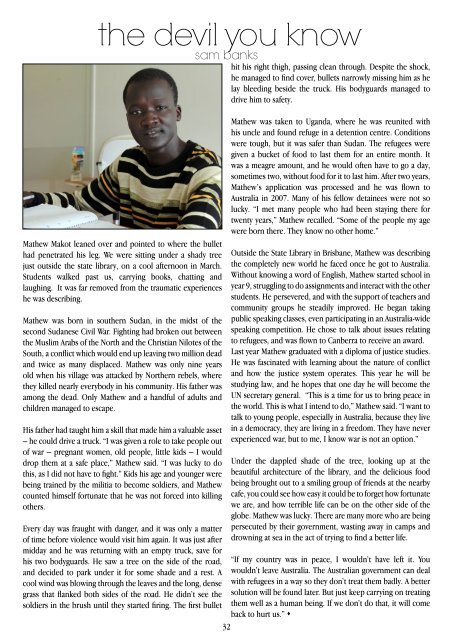one page: brisbane
You also want an ePaper? Increase the reach of your titles
YUMPU automatically turns print PDFs into web optimized ePapers that Google loves.
the devil you know<br />
Mathew Makot leaned over and pointed to where the bullet<br />
had penetrated his leg. We were sitting under a shady tree<br />
just outside the state library, on a cool afternoon in March.<br />
Students walked past us, carrying books, chatting and<br />
laughing. It was far removed from the traumatic experiences<br />
he was describing.<br />
Mathew was born in southern Sudan, in the midst of the<br />
second Sudanese Civil War. Fighting had broken out between<br />
the Muslim Arabs of the North and the Christian Nilotes of the<br />
South, a conflict which would end up leaving two million dead<br />
and twice as many displaced. Mathew was only nine years<br />
old when his village was attacked by Northern rebels, where<br />
they killed nearly everybody in his community. His father was<br />
among the dead. Only Mathew and a handful of adults and<br />
children managed to escape.<br />
His father had taught him a skill that made him a valuable asset<br />
– he could drive a truck. “I was given a role to take people out<br />
of war – pregnant women, old people, little kids – I would<br />
drop them at a safe place,” Mathew said. “I was lucky to do<br />
this, as I did not have to fight.” Kids his age and younger were<br />
being trained by the militia to become soldiers, and Mathew<br />
counted himself fortunate that he was not forced into killing<br />
others.<br />
Every day was fraught with danger, and it was only a matter<br />
of time before violence would visit him again. It was just after<br />
midday and he was returning with an empty truck, save for<br />
his two bodyguards. He saw a tree on the side of the road,<br />
and decided to park under it for some shade and a rest. A<br />
cool wind was blowing through the leaves and the long, dense<br />
grass that flanked both sides of the road. He didn’t see the<br />
soldiers in the brush until they started firing. The first bullet<br />
sam banks<br />
32<br />
hit his right thigh, passing clean through. Despite the shock,<br />
he managed to find cover, bullets narrowly missing him as he<br />
lay bleeding beside the truck. His bodyguards managed to<br />
drive him to safety.<br />
Mathew was taken to Uganda, where he was reunited with<br />
his uncle and found refuge in a detention centre. Conditions<br />
were tough, but it was safer than Sudan. The refugees were<br />
given a bucket of food to last them for an entire month. It<br />
was a meagre amount, and he would often have to go a day,<br />
sometimes two, without food for it to last him. After two years,<br />
Mathew’s application was processed and he was flown to<br />
Australia in 2007. Many of his fellow detainees were not so<br />
lucky. “I met many people who had been staying there for<br />
twenty years,” Mathew recalled. “Some of the people my age<br />
were born there. They know no other home.”<br />
Outside the State Library in Brisbane, Mathew was describing<br />
the completely new world he faced once he got to Australia.<br />
Without knowing a word of English, Mathew started school in<br />
year 9, struggling to do assignments and interact with the other<br />
students. He persevered, and with the support of teachers and<br />
community groups he steadily improved. He began taking<br />
public speaking classes, even participating in an Australia-wide<br />
speaking competition. He chose to talk about issues relating<br />
to refugees, and was flown to Canberra to receive an award.<br />
Last year Mathew graduated with a diploma of justice studies.<br />
He was fascinated with learning about the nature of conflict<br />
and how the justice system operates. This year he will be<br />
studying law, and he hopes that <strong>one</strong> day he will become the<br />
UN secretary general. “This is a time for us to bring peace in<br />
the world. This is what I intend to do,” Mathew said. “I want to<br />
talk to young people, especially in Australia, because they live<br />
in a democracy, they are living in a freedom. They have never<br />
experienced war, but to me, I know war is not an option.”<br />
Under the dappled shade of the tree, looking up at the<br />
beautiful architecture of the library, and the delicious food<br />
being brought out to a smiling group of friends at the nearby<br />
cafe, you could see how easy it could be to forget how fortunate<br />
we are, and how terrible life can be on the other side of the<br />
globe. Mathew was lucky. There are many more who are being<br />
persecuted by their government, wasting away in camps and<br />
drowning at sea in the act of trying to find a better life.<br />
“If my country was in peace, I wouldn’t have left it. You<br />
wouldn’t leave Australia. The Australian government can deal<br />
with refugees in a way so they don’t treat them badly. A better<br />
solution will be found later. But just keep carrying on treating<br />
them well as a human being. If we don’t do that, it will come<br />
back to hurt us.” s



